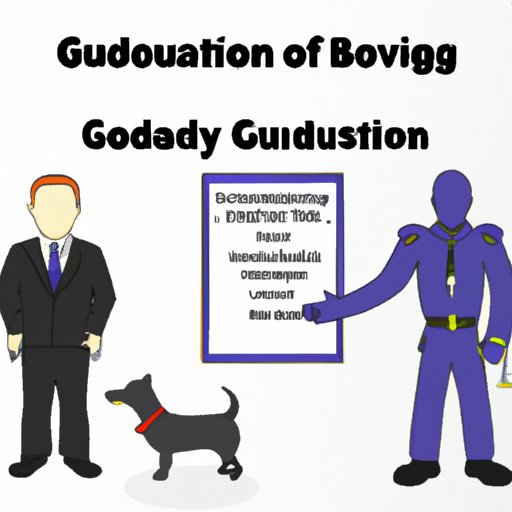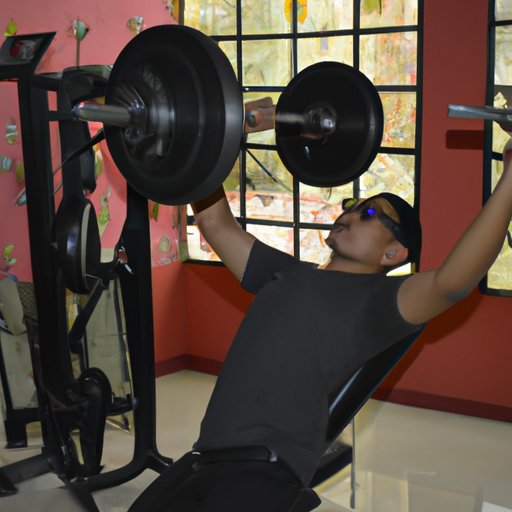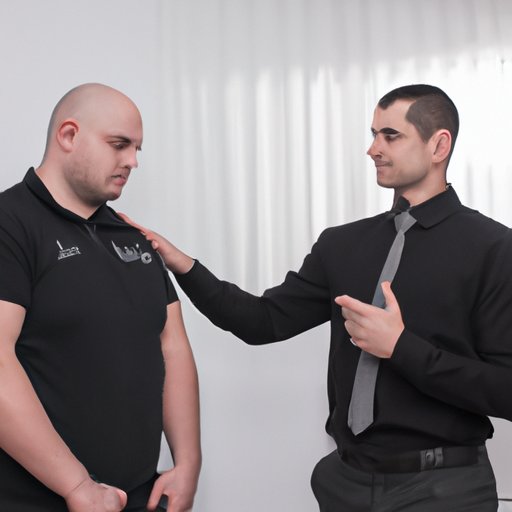Introduction
Bodyguarding is an important part of many industries, from entertainment to security. A bodyguard is a professional who provides personal protection to individuals or groups. This can involve protecting them from threats such as physical attacks, intimidation, and kidnapping. It also involves providing security for events, such as concerts or conferences.
The purpose of this article is to explore how to become a bodyguard. It will discuss the qualifications and requirements needed for the job, as well as the self-defense techniques, communication skills, laws and regulations, protocols, and physical fitness needed to perform the job.
Qualifications and Requirements Needed to Become a Bodyguard
In order to become a bodyguard, there are certain qualifications and requirements that must be met. These include education, training, and licensing.
Education
Most employers require bodyguards to have a high school diploma or equivalent. However, some may prefer applicants with additional education in criminal justice, law enforcement, or security.
Training
Many employers also require bodyguards to complete specialized training courses. These courses may cover topics such as self-defense, surveillance, emergency response, and crisis management. Training courses may be offered through private security companies, law enforcement academies, or other organizations.
Licensing
In some states, bodyguards may need to obtain a license or certification in order to work. Licensing requirements vary by state, so it is important to check with the local government to determine what is required.
Self-Defense Techniques for Professional Protection
A bodyguard must be proficient in self-defense techniques in order to protect their client. There are various types of self-defense techniques that can be used, depending on the situation. These include martial arts, defensive tactics, and firearms training.
Types of Self-Defense Techniques
Martial arts such as judo, karate, and tae kwon do are popular self-defense techniques. They can teach bodyguards how to defend themselves against physical attacks. Defensive tactics training teaches bodyguards how to respond to dangerous situations and use non-lethal force to subdue attackers. Firearms training is also important for bodyguards, as they may need to use firearms to protect their clients in extreme cases.
Benefits of Learning Self-Defense
Learning self-defense techniques can help bodyguards stay safe while on the job. It can also give them more confidence in their abilities to protect their clients. Additionally, self-defense techniques can help bodyguards de-escalate potentially violent situations.
Develop Good Communication Skills for De-Escalation
Good communication skills are essential for bodyguards. They must be able to effectively communicate with their clients, as well as potential threats. This can help them defuse tense situations, and prevent violence before it even begins.
Active Listening
Bodyguards must be able to listen to their clients and understand their needs and concerns. This requires active listening, which involves focusing on what the person is saying, and responding in a way that shows understanding.
Conflict Resolution
Bodyguards must also be adept at conflict resolution. This involves using negotiation and other strategies to resolve disputes without resorting to violence. It is important for bodyguards to remain calm and composed when dealing with difficult people.
Verbal De-escalation
Verbal de-escalation techniques can be used to defuse potentially violent situations. This involves using calming language and non-threatening body language to reduce tension and prevent violence.

Understand Laws and Regulations Related to Bodyguarding
Bodyguards must have a thorough understanding of the laws and regulations related to their job. This includes both local and federal laws, as well as civil rights laws that protect individuals from discrimination.
Local Laws
Bodyguards must be familiar with the laws in the area where they are working. This includes laws related to self-defense, firearms, and the use of force. It is also important to know any specific regulations related to bodyguarding in the area.
Federal Laws
Bodyguards must also be aware of federal laws related to their job. These include laws related to privacy, civil rights, and the use of force. It is important to know these laws in order to ensure compliance.
Civil Rights
Bodyguards must also be aware of civil rights laws that protect individuals from discrimination. This includes laws related to race, gender, religion, and sexual orientation. It is important to treat all individuals with respect and dignity, regardless of their background.

Establish Proper Protocols for Monitoring and Responding to Potential Threats
Bodyguards must establish proper protocols for monitoring and responding to potential threats. This includes surveillance, response strategies, and reporting procedures.
Surveillance
Bodyguards must be able to monitor their environment for potential threats. This involves staying alert and being aware of any suspicious activity. It is also important to be able to identify potential threats and take appropriate action.
Response Strategies
Bodyguards must also have strategies in place for responding to threats. This may involve calling for backup, using self-defense techniques, or using non-lethal force. It is important to have a plan in place for how to respond in any given situation.
Reporting Procedures
Bodyguards must also have protocols in place for reporting any incidents or threats. This involves documenting details of the incident, notifying the proper authorities, and filing reports with the appropriate agencies.

Maintain Physical Fitness and Mental Readiness for the Job
In order to be successful as a bodyguard, it is important to maintain physical fitness and mental readiness. This includes having a regular exercise routine, eating a healthy diet, and practicing mental preparation techniques.
Exercise Routines
Bodyguards must be physically fit in order to handle the demands of the job. This involves having a regular exercise routine that includes strength training, cardio, and flexibility exercises.
Nutrition
Bodyguards must also pay attention to their nutrition. Eating a balanced diet that includes plenty of fruits, vegetables, and lean proteins can help keep bodyguards energized and mentally sharp.
Mental Preparation
Bodyguards must also practice mental preparation techniques. This may involve meditation, visualization, or positive affirmations. Practicing these techniques can help bodyguards stay focused and prepared for any situation.
Conclusion
Becoming a bodyguard requires a commitment to training, education, and staying physically and mentally fit. Bodyguards must be knowledgeable about self-defense techniques, communication skills, laws, protocols, and physical fitness in order to be successful. With the right qualifications and training, bodyguards can provide professional protection for their clients.
In summary, this article has discussed how to become a bodyguard. It has explored the qualifications and requirements needed for the job, as well as the self-defense techniques, communication skills, laws and regulations, protocols, and physical fitness needed to perform the job. For more information, consult the resources listed below.
Additional Resources
- Security Guard Training HQ
- Justice Training Solutions
-
(Note: Is this article not meeting your expectations? Do you have knowledge or insights to share? Unlock new opportunities and expand your reach by joining our authors team. Click Registration to join us and share your expertise with our readers.)
